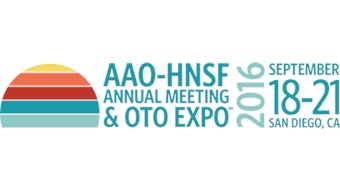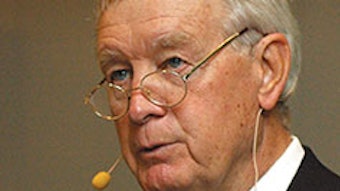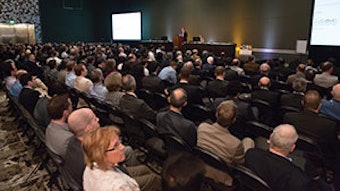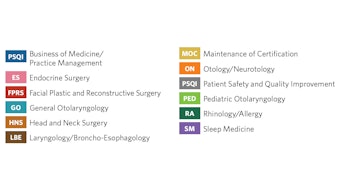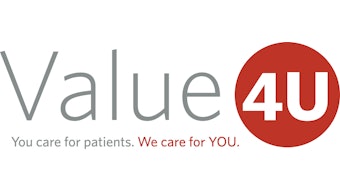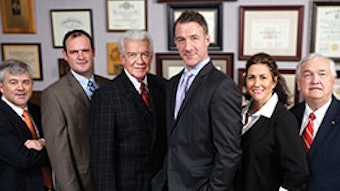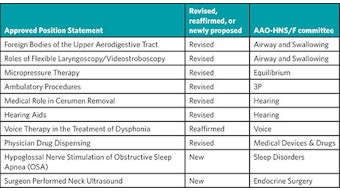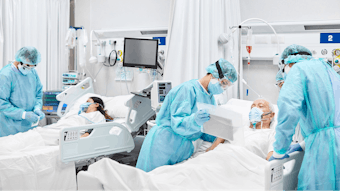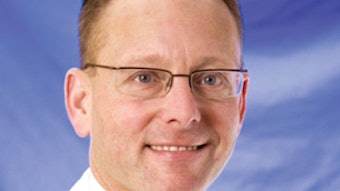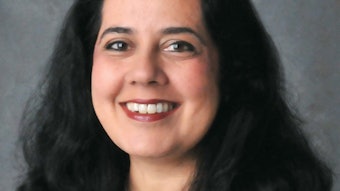Spring overture
Registration for this year’s AAO-HNSF Annual Meeting & OTO EXPOSM in one of our favorite locations, San Diego, opened May 2. I encourage you to take advantage of the early registration discounts for what promises to be an exceptional meeting.
 James C. Denneny III, MD
James C. Denneny III, MD
AAO-HNS/F EVP/CEO
Our new ceremony production company, Fusion, is recognized as one of the most pioneering enterprises in the industry. The inaugural Legends of Otolaryngology series presentation will feature M. Eugene Tardy, Jr., MD, the first awardee. We will present the latest update on our clinical data registry, RegentSM, which we anticipate to be in full operation by the Annual Meeting. An additional stimulating educational opportunity will also make its first appearance this year. The International Symposium will comprise papers and Miniseminars submitted by our international colleagues, extending an exceptional learning opportunity for both domestic and international attendees. The OTO Experience will offer an expanded “hands-on” demonstration lineup on the exhibit floor this year.
Months of hard work culminated in the recent CMS announcement granting Qualified Clinical Data Registry (QCDR) status to our clinical data registry, RegentSM (see page 30). This designation is a critical step in providing our Members expanded reporting options under the Physician Quality Reporting System (PQRS) and impending Merit-Based Incentive Payment System (MIPS) and sets the stage for developing more performance and outcomes measures.
Our goal of completing the pilot phase of our clinical data registry, RegentSM, and beginning the actual operation of the registry is on track. We have signed up a significant number of practitioners who are now pilot testing the measures that will be used for initial reporting and study. We have populated our Clinical Advisory panels including representatives from the clinically appropriate specialty societies and the American Board of Otolaryngology. We anticipate beginning registration and contracting for operation of the registry soon as the pilot phase winds down. We’re targeting the official launch of the registry around the time of the Annual Meeting. There is still much work to do to accomplish that. The power that RegentSM will bring our specialty is directly related to the penetration within practicing academic and private otolaryngologists and number of patient encounters we can document. I encourage our Members to join RegentSM and help take charge of your future.
The vote is now
This year we are in the middle of a volatile presidential election, but don’t overlook our own AAO-HNS elections, which take place this month and next. Your Nominating Committee, chaired by Past-president Gayle E. Woodson, MD, has selected an exceptional slate of candidates well-qualified to represent you! Please review the candidates’ statements and additional information on the ENTConnect “Candidate Forum” and then exercise your right as a Member to vote for your leaders. What happens over the next three-to-five years will likely shape your practice for decades.
This month we are launching a new feature that I hope will “put a face” to our Members and the increasing variety of practice situations they work in. We will highlight practices of all types across the country and the unique as well as shared problems they all face. This will give us the chance to clarify solutions available and educate our Members as to the efforts made on their behalf and in turn gather information from you to help direct our future areas of focus.
The FDA, stimulated by the President’s Council of Advisors on Science and Technology (PCAST) report on strategies to increase access and affordability of hearing healthcare, held a workshop April 21 titled “Streamlining Good Manufacturing Practices for Hearing Aids.” Consideration is being given for an entry-level hearing aid classification to be available over the counter and online. I presented the Academy’s position at this workshop.
I also attended the Accreditation Council for Graduate Medical Education (ACGME) “Congress” concerning resident work hour regulations recently in Chicago over a two-day period. There was a great deal of discussion over the 80-hour workweek and adding some flexibility within the system to reflect different needs that exist in surgical training programs. Once the ACGME promulgates their new policy, we will report on it in the Bulletin. Until then, we are here for you.
